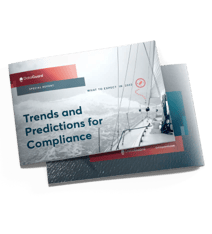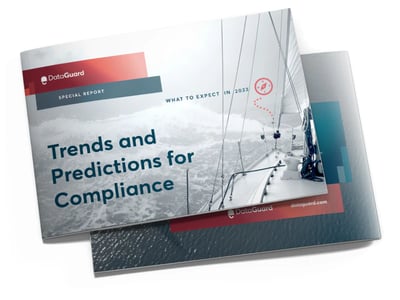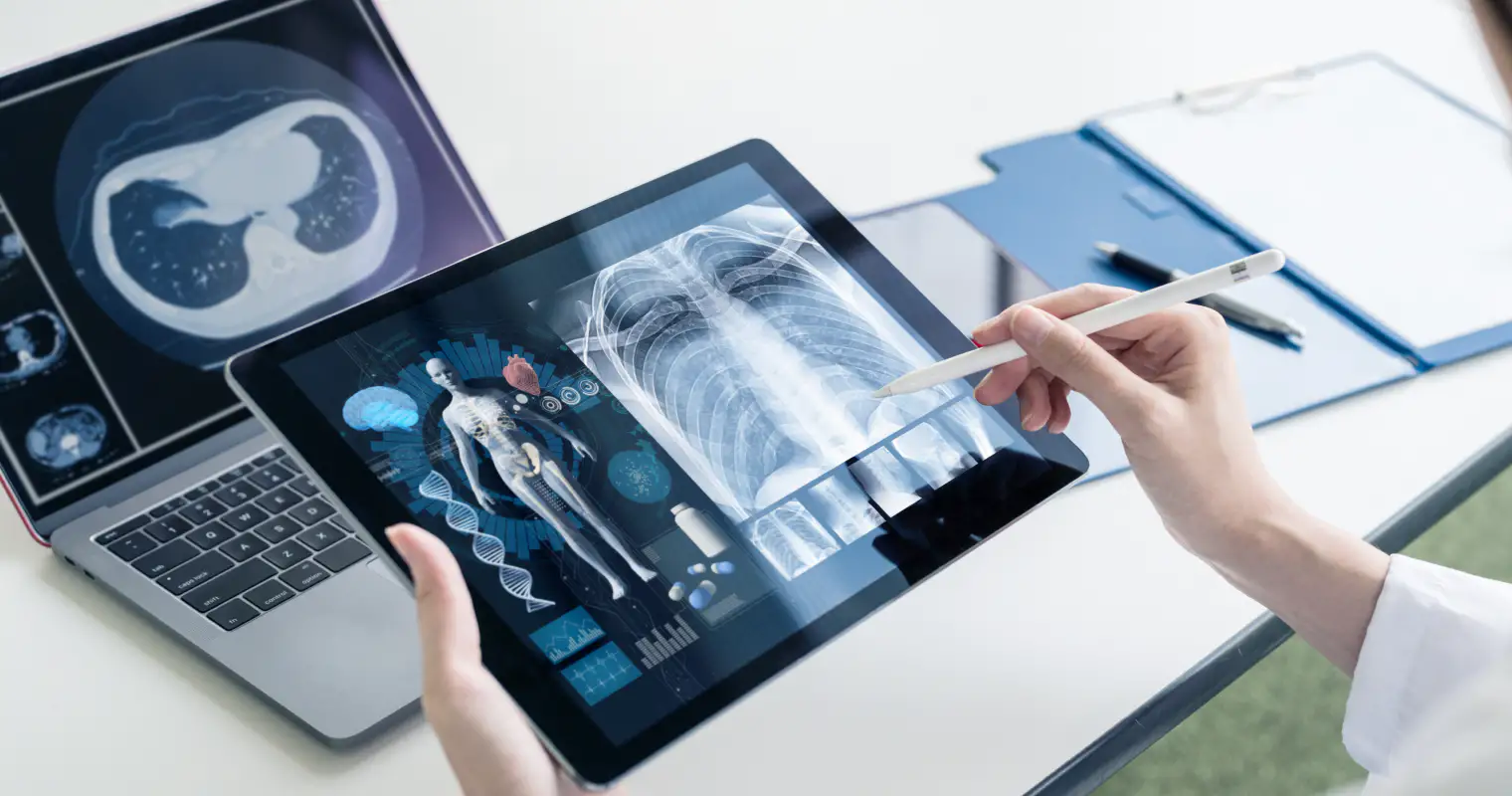The facts in a nutshell
- The healthcare industry is responsible for managing highly sensitive data, making it an active target for cybercriminals. 34.9% of breaches occurring in this sector alone last year, emphasising the importance of data privacy
- The growing digitisation of healthcare operations introduces new challenges, mainly concerning personal data protection. Navigating this digital transformation responsibly requires adhering to robust regulatory measures, such as the UK General Data Protection Regulation (UK GDPR) and the Data Protection Act 2018 (DPA 2018).
- The UK GDPR sets standards for processing personal data, outlining requirements around lawful bases for processing, data subject rights, and more. Breaching these rules can lead to substantial penalties.
- The DPA 2018 complements the UK GDPR by tailoring its application to specific UK circumstances and covering areas not included in the UK GDPR, like law enforcement and intelligence agencies' data processing.
- While the UK GDPR was derived from the EU GDPR, it has some differences when it comes to healthcare. For instance, the UK GDPR includes special healthcare research laws enforced by the Information Commissioner's Office (ICO) rather than EU regulators.
- Healthcare companies can adopt risk management strategies like consent, preference management, and employee training to ensure compliance and deliver quality services.
- The UK GDPR is not the only standard to follow. Complying with other industry-specific regulations can give you a competitive edge, and you can use information security toolkits to do this.
What does the UK GDPR say about healthcare?
The UK GDPR, which came into effect in 2021, outlines the fundamental principles, rights, and responsibilities governing the handling of personal data in the UK. Enforcement and intelligence agencies are exempt.
To comply with this regulation, it's crucial first to gain a technical understanding of the terminologies used. If you're in the healthcare sector, here are some relevant terms to familiarize yourself with:
|
Personal data |
Any information relating to an identifiable person, such as a patient's name, address, or medical records. |
|
Sensitive personal data |
Information about a person's health, genetic data, and biometric data, among other types of information. |
|
Data processing |
Any operation or set of operations performed on personal data, such as collection, storage, use, or disclosure. |
|
Data controller |
The company or individual responsible for determining the purposes and means of processing personal data. |
|
Data processor |
A company or individual that processes personal data on behalf of the data controller. |
|
Data subject |
The individual to whom the personal data relates. |
|
Consent |
The data subject's freely given, specific, informed, and unambiguous indication of their agreement to process their personal data. |
|
Right to access |
The data subject's right to obtain a copy of their personal data held by the data controller. |
|
Right to erasure |
The data subject's right to have their personal data erased in certain circumstances. |
Although it is similar to the EU GDPR, the UK GDPR has its differences in healthcare. For instance:
- It has special laws regarding healthcare research and permits health data processing for certain public interest objectives. According to the UK GDPR, health data includes, but is not limited to:
- Patient medical records
- Doctor and hospital notes
- Health insurance information
- Prescriptions
- Biometric data
- Mental health information
- Emergency contact information
- It is enforced by the Information Commissioner's Office (ICO) rather than EU regulators. The ICO is responsible for investigating any possible violations of GDPR regulations in healthcare companies. This institution is also responsible for investigating potential breaches and issuing fines for non-compliance. Moreover, it provides guidance to healthcare companies on how to comply with the GDPR.
Understanding and navigating the requirements of the UK GDPR is not easy, but with a clear set of objectives, you can implement the right processes to stay compliant.
What are the steps to UK GDPR compliance for healthcare companies?
As a healthcare provider, you are responsible for protecting patient data and staying prepared for data breaches, especially if you want to comply with the UK GDPR. You can also ensure business continuity by developing and implementing incident response strategies according to the regulation.
The following checklist can help you achieve these goals:
- Appoint a Data Protection Officer
The Data Protection Officer (DPO) is responsible for ensuring that your company complies with the UK GDPR. Moreover, it acts as a point of contact for data subjects and supervisory authorities.
Their tasks include monitoring data protection activities, providing advice and guidance on GDPR compliance, and ensuring that employees are trained on data protection best practices. - Create a GDPR-compliant privacy policy
This policy should provide information about how personal data is processed, who it is shared with, and how long it is retained. It must also be easy to understand and be written clearly.
The policy must describe people's rights under the UK GDPR. These include the right to view their personal data, have it removed, and object to how it's being used. - Obtain valid consent for data processing
Under the UK GDPR, individuals must provide explicit consent before their personal data can be processed. You must obtain valid consent from patients before collecting, processing, or sharing their personal data.
The consent must be freely given, specific, informed, and unambiguous. Individuals must be able to withdraw their consent at any time. - Train employees on UK GDPR and data protection
All employees who handle personal data should receive training on the UK GDPR and data protection best practices. This includes information about how to handle sensitive data, recognise and respond to data breaches, and obtain valid consent from individuals.
To keep up with changes to the UK GDPR and new risks to data protection, employees should receive regular training. This helps ensure they stay informed and up-to-date. - Implement data breach response procedures
Your company should have procedures in place to detect, report, and investigate data breaches. You should be able to notify data subjects and supervisory authorities in a timely manner and take steps to minimise the impact of the breach and prevent future incidents.
You should also conduct regular reviews of your company’s data protection practices to identify and address any vulnerabilities that could lead to a breach. - Manage third-party data processors
Ensure that any third-party data processors you work with are GDPR-compliant. This includes signing GDPR-compliant contracts and monitoring the processors' data protection practices.
You should also conduct regular audits of third-party data processors to ensure that they are meeting UK GDPR requirements. - Perform regular data protection audits
Regular audits of data protection practices should be conducted to ensure compliance with the UK GDPR. These audits involve reviewing privacy policies, data processing activities, and data security measures.
Additionally, you must identify any areas of non-compliance and take steps to address them.
Following this checklist can help you plan the steps needed to comply with the UK GDPR. This can provide your company access to key short- and long-term benefits.
What are the benefits of UK GDPR compliance for healthcare companies?
Complying with the UK GDPR brings a range of benefits to healthcare companies, especially in terms of enhancing patient trust and confidence, improving data management and security practices, and reducing the risk of GDPR fines and penalties.
Let’s explore each of these benefits in detail.
- Enhancing patient trust and confidence
Complying with the UK GDPR helps build patient trust and confidence by demonstrating your commitment to protecting personal data. To achieve these benefits, healthcare companies can take several steps, such as:- Obtaining valid consent for data processing,
- implementing secure data management and storage practices, and
- having transparent and GDPR-compliant privacy policies.
- Improving data management and security practices
The UK GDPR requires companies to implement robust management and security practices like:- Encryption and anonymisation techniques
- Regular data protection audits
- Data breach response procedures
- Reducing the risk of UK GDPR fines and penalties
Non-compliance with the UK GDPR can result in significant fines and penalties for any company. By being GDPR compliant, you can reduce these risks and protect your company from reputational damage.
Patients today have more control over their data, making it easier for patients to file claims for breaches. Being non-compliant can impact the long-term trust patients place in your company in the future.
Complying with the UK GDPR has many benefits, and these are just a few. However, an extra benefit of the regulation is that it allows companies to share personal data lawfully and safely.
How can the UK GDPR help to balance patient privacy with data sharing and collaboration?
The UK GDPR provides a legal and ethical framework for data processing in the healthcare industry. Allowing a balance between patient privacy, data sharing and collaboration. This framework consists of the following:
- Patient consent for data processing
To process patient data lawfully, it's essential to obtain valid consent from patients. This involves informing patients about how their data will be used and obtaining explicit consent for its processing. By doing so, you can respect patient privacy while still being able to share patient data lawfully. - Encryption and anonymisation techniques
The UK GDPR's encryption and anonymisation requirements enable companies to use patient data securely and protect it from malicious actors. Encryption helps protect the data by converting it into a form that can only be accessed with a specific key or password. Anonymisation makes it safer to share by removing or masking personally identifiable information. - Cross-border data transfers and international regulation
The UK GDPR allows for the lawful transfer of personal data to countries outside the UK and EU. This means you can share patient data with companies in different countries while complying with the UK GDPR. For example, the UK GDPR is aligned with the Health Insurance Portability and Accountability Act (HIPAA). This alignment can facilitate data sharing and collaboration between healthcare companies operating in different countries.
Balancing privacy and data sharing can minimise the risk of security breaches and data theft, helping you to avoid fines and penalties under the UK GDPR. To further comply with the regulation, you can also look at implementing specific risk management strategies.
What are some strategies for minimising risk and ensuring compliance in healthcare?
Ensuring compliance and minimising risk is essential for any healthcare company to maintain patient trust and deliver quality care. In this context, consider adopting the following strategies to incorporate privacy and safety into business operations:
- Employee and contractor awareness training - Regular training for employees and contractors can help keep them up-to-date with security best practices. This helps ensure that they are knowledgeable and capable of protecting against security risks. Compliance and risk management training can cover topics like:
- Data protection - Training on data protection regulations like the GDPR and HIPAA can help the trainees understand how to handle medical records, obtain patient consent and ensure that data is protected from unauthorised access, theft, or loss.
- Confidentiality - Medical staff should understand the importance of patient confidentiality and how to protect it. They should be aware of the Confidentiality NHS Code of Practice and should follow best practices for protecting patient information.
- Records management - Training on the Records Management Code of Practice for Health and Social Care 2016 outlines the best practices for managing, storing, handling and destroying medical data.
- Managing patient consent for data processing - While the first step of lawful data processing is obtaining the patient’s consent, you must also know how to process and share this data safely.
You should implement clear and transparent processes for obtaining and managing patient consent. Patients should be informed of the purpose of data processing, the types of data being processed, and how their data will be used. Patients should also be given the opportunity to withdraw their consent at any time.
- Navigating through other data protection regulations - In addition to complying with national data protection regulations, you should also comply with other relevant regulations, such as NIST and HIPAA. To do this, you can follow the below standards and tools:
- NHS Digital Data Security and Protection Toolkit
- Confidentiality NHS Code of Practice
- Records Management Code of Practice for Health and Social Care 2016
- Information Governance Toolkit (IGT)
- Data Protection Act 2018
- NHS England's Personal Confidential Data (PCD) Policy and Data Security and Protection Toolkit
Data protection laws provide steps to help healthcare companies keep their data safe. This is especially important as digitization and cyber threats are increasing. It's important to comply with these laws, not only because it's mandatory but because it helps you avoid the risks and dangers of unsafe data processing.
If you need help setting up these processes, our experts at DataGuard are happy to help.


What to Expect in 2023: Trends and Predictions for Compliance
Stay informed about the latest compliance trends in our exclusive report. Get valuable insights into the UK GDPR and DPA 2018 regulations, applicable to healthcare and beyond.










